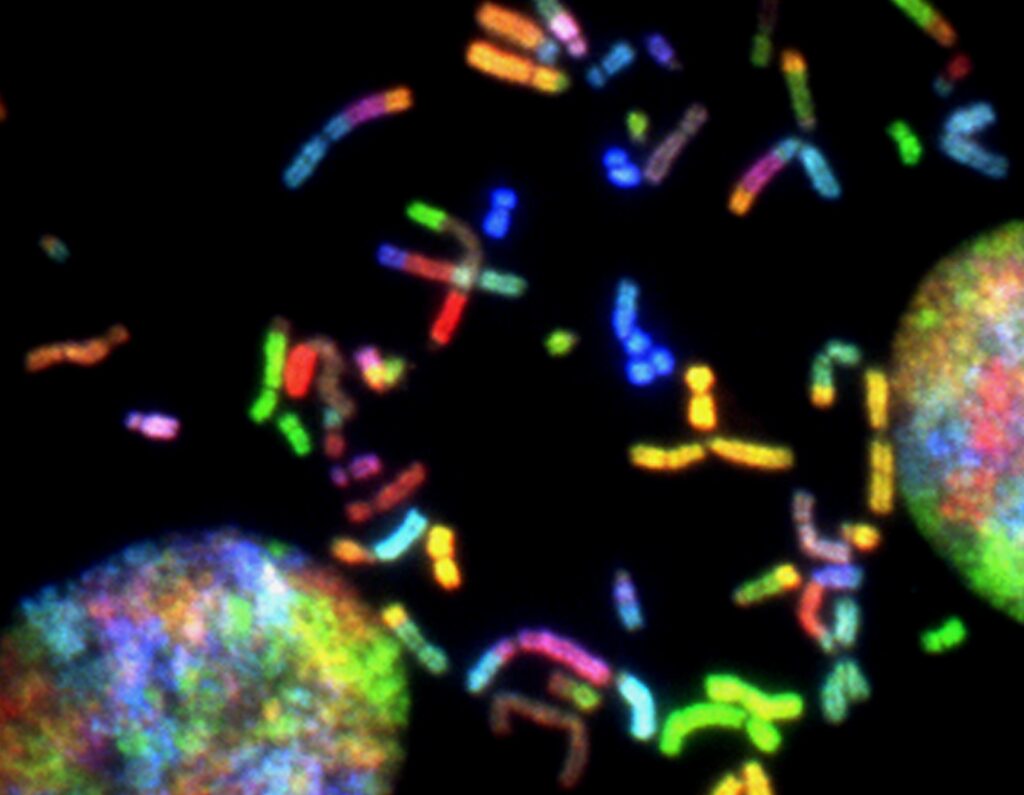What is Chromosomal Microarray?
It is a form of genetic testing which identifies duplicate or extra parts of chromosomes, or missing and deleted chromosomal parts.
This includes chromosomal microdeletions and microduplications involving multiple genes, chromosomal conditions involving a chromosome number (Down syndrome is one of these), and translocations, where the chromosomal structure is unbalanced or rearranged.
Chromosomal microarray has a particular diagnostic purpose. It can not identify point mutations, that is small changes in the sequencing of single genes. Nor can it identify very small duplications and deletions within just one gene (Fragile X for example), balanced chromosomal translocations, and inversions.
It is essentially a microchip-based testing platform. This means it can handle high-volume, automated analysis of multiple pieces and parts of DNA at once. This analysis involves the screening of specific chromosome regions through labels. Reference samples are then used, and compared to the genetic material identified in a patient. Any differences between the patient and the sample are known as variants.
When is chromosomal microarray recommended?
As a form of genetic analysis testing it may be recommended for patients who show specific symptoms but don’t have a clear diagnosis of a particular rare disease.
These symptoms include anything related to development delay, intellectual development, and symptoms associated with autism. Developmental delay may include gross motor, speech and language, and cognitive delay. Symptoms associated with autism or autism spectrum disorder might include issues with shared play, social communication and interaction, and a pattern of repetitive behaviors or very specific interests.
Other symptoms include unique facial features, involving any part of the face. These can include features affecting the size and shape of more than one facial feature. Examples include widely-spaced eyes, a long philtrum, a broad nasal bridge, and a large forehead, but these features may be wide-ranging and varied.
If a genetic counselor suspects an individual may have one or more rare conditions, that would require testing, such as chromosomal microarray, which can focus on multiple changes or anomalies across genes. The presence of more than one rare disease in an individual may lead to the development of symptoms that can not be assigned to one condition, and further testing would be required.
Ongoing research into the possible reasons for using Chromosomal Microarray, look set to widen the scope of this particular type of genetic testing. There is an increased interest in using it also for those patients who present with symptoms relating to unexplained seizures, growth delay, psychiatric illness, and conditions affecting the neuromuscular system of the body.
In terms of diagnosis rates, Chromosomal Microarray can reach a diagnosis in 10-15% of cases. This is higher than the 3% from traditional testing.
Chromosomal Microarray can diagnose the majority of chromosomal changes that are also currently detected by karyotype genetic testing. However, it is most commonly used when a patient does not fit the symptoms of a specific genetic syndrome. It is not recommended for patients who have clear symptoms of a rare disease, as karyotype genetic testing is more than adequate in these instances. It is also not able to diagnose syndromes, such as Fragile X, and anyone with suspected symptoms of such a syndrome would not be referred for Chromosomal Microarray.
Chromosomal microarray and genetic counseling
The person most likely to refer a patient for this type of genetic testing is a genetic counselor. Based on a patient’s medical history, and their symptoms, as well as information about their family’s genetic health, a genetic counselor will be able to refer them for Chromosomal Microarray testing. Also if previous standard genetic testing did not reveal any gene mutations or gene changes, or confirm a rare disease diagnosis, it may be recommended.
The development of more advanced genetic testing methods is helping to ensure rare disease patients receive a faster, and more accurate diagnosis. This in turn means they can access necessary support and early intervention, to manage the symptoms of their syndrome.
Finding genetic testing near me? This is not always an easy process. A genetic counselor, either online or in-person, will be able to direct an individual toward the relevant testing options.



